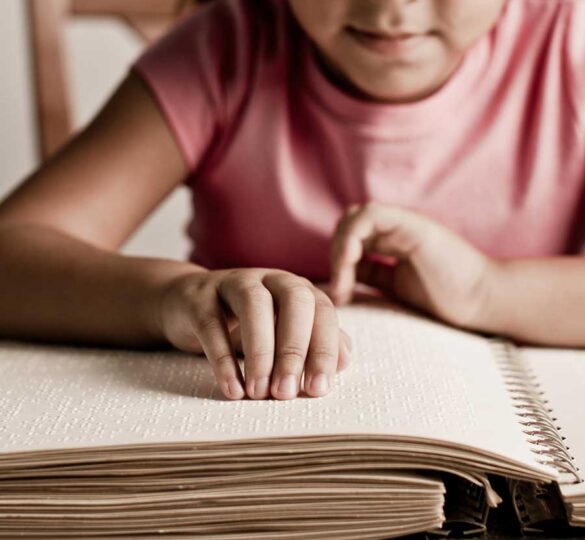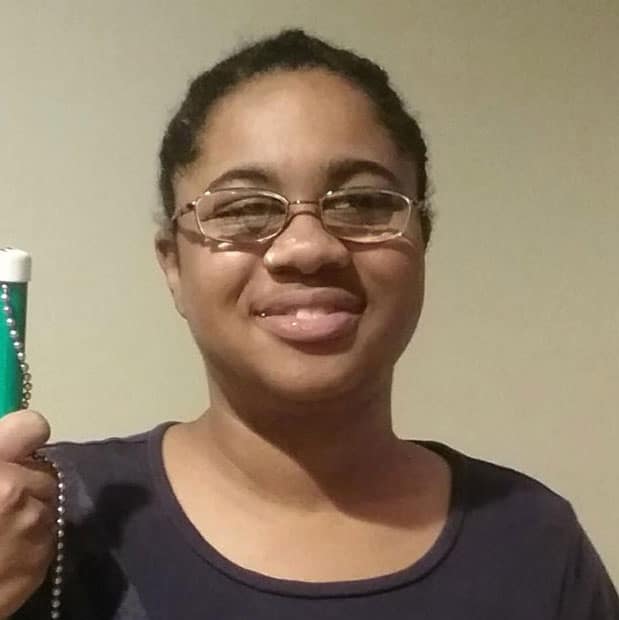What Does Braille Have to Do With Glaucoma?
"My advice for the blind community is to be prepared for what life may throw at you and be open to learn new things." — Jasmyn Polite

In my personal experience with having glaucoma and being visually impaired, at some point in my life, I will have to use Braille. When I was a young child, I thought that Braille didn’t apply to me and it was too hard to learn; however, that all changed when I started volunteering at my school as a teacher’s aide for the first grade students in 10th and 11th grade at the Florida School for the Deaf and Blind in St. Augustine, Florida.
I had a hard time working with the students who were blind because I didn’t know Braille at all. This ordeal made me feel bad since I couldn’t be connected to the blind community or others who may have had glaucoma like me. One mistake that my blind school made with me was not teaching me Braille from elementary to high school based on how progressive my eye condition could possibly be. As a result over the years, I started asking my friends who were blind to help me learn Braille and provide me with materials to practice. I even took a Braille class at my school when I entered my senior year of high school.
My friends gave me a Braille writer, books, paper, and a slate and stylus (another writing device that produces Braille). I even received Braille books from the National Federation for the Blind, American Action Fund for Blind Children and Adults, and the Iowa Department for the Blind’s Talking Library in Des Moines.
To buff up my Braille literacy skills while out of high school, I decided to take Braille through the Iowa Department for the Blind, Hadley Institute for the Blind and Visually Impaired, and getting help from my mentor, Ted Hart, from the National Federation for the Blind.
My advice for the blind community is to be prepared for what life may throw at you and be open to learn new things. I’m not afraid if I go blind from glaucoma because I know how to use Braille along with the skills I learned when I was blindfolded at the Iowa Department for the Blind’s Orientation Center last year. It’s always important to have a plan just in case a disaster happens in your life.
Why Should Glaucoma Patients With Partial Sight Learn Braille?
You’re probably wondering why those with some sight from glaucoma should learn Braille? Well, let me give you a very simple answer to this question: being prepared for the unexpected. The truth is, even though you might have your eye pressures controlled with eye drops or surgeries for a long time, glaucoma can still be progressive and possibly get worse despite those treatments. That’s why I recommend that glaucoma patients learn Braille.
Yes, you might be okay right now, but what if years from now your eyesight starts to deteriorate? We all must think of what the future will hold for us and be ready for the challenges that will come our way. So, if you do go blind from glaucoma and you already know Braille, you will be able to function and live your life.
I have some friends who are blind from glaucoma and know Braille very well. My friend Ciara, who is totally blind from glaucoma gave me some really helpful tips on learning Braille. One of tips I will always keep with me as I continue my studies is to practice as much as I can and set goals every time I learn a new contraction or word in Braille. Just like what my Braille tutor, Ted, told me many times, Ciara reminded me that glaucoma could make me blind, so I should learn Braille and take it seriously.
Living With Glaucoma by Using Braille
Braille can help young and old people with glaucoma in addition to using magnifiers, large print materials, or audio books. Magnifiers and large print do make it easier to read, but even these can cause eye strain. Audio books are great, but they don’t help the blind and visually impaired develop their brain through touch.
There is nothing better than touching a book and experiencing it. Braille can be helpful in many ways: labeling items, reading, making notes, etc. If you have glaucoma, I advise using Braille in your everyday lives to function. Even those with some sight can use Braille in case reading with the eyes becomes too cumbersome. It’s nice to have options in life!
First posted on March 16, 2018; Reviewed on June 16, 2022

Jasmyn Polite
Jasmyn Polite was born with bilateral cataracts and diagnosed with glaucoma at age 9. Now a college student, Jasmyn’s goal is to help motivate and encourage other people who are struggling with glaucoma.